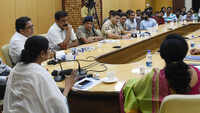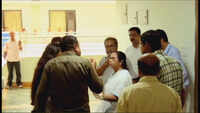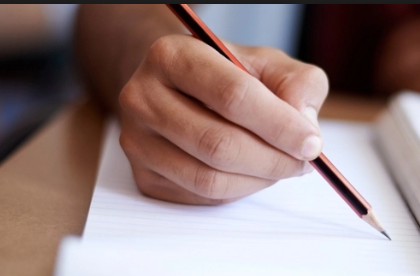
Kolkata: Mamata Banerjee, the guardian-next-door — sometimes warm, sometimes stern but always concerned and caring — gave the biggest mid-term boost that Mamata Banerjee, the chief minister, probably needed in her hour of crisis.
The Bengal CM and her administration, which seemed to be on a collision course with the striking junior doctors till Friday afternoon (when she delivered her “outsider” speech in North 24 Parganas’ Bijpur), radically altered their approach in the course of one evening and pulled off one of their biggest public-relations wins in recent memory, evident in the thunderous applause that followed the Nabanna meeting on Monday.
Senior government officials told TOI on Monday that it was Friday’s sequence of events that was critical to the turnaround. Banerjee went to SSKM hospital on Thursday, where she delivered her “outsider” jibe at striking doctors while taking up the cause of suffering patients. On Friday, at the North 24 Parganas meet, she repeated her “outsider” line around 2.30pm. It was also on Friday that several senior physicians made up their mind to resign from the state health service to follow in the footsteps of their junior colleagues, who had started tendering mass resignations as a mark of protest against the government.
A few hours later, however, some of the same doctors — who were contemplating giving up their career in the public sector — were at Nabanna by Banerjee’s side. Four of them were senior doctors “held in high esteem by the medical fraternity but also considered to be pillars of the government’s healthcare set-up”, officials said. Their senior, 83-year-old veteran physician Sukumar Mukherjee, made up the last member of the group of five.
State director of medical education Pradip Mitra, anyway, had been the key negotiator with striking doctors. Together, these half-a-dozen senior physicians became the Banerjee government’s intermediaries to reach out to agitators. The CM had, finally, found a key core group — made up of respected medical professionals who were also trusted by the establishment — to bridge the gap between the medical fraternity and the government.
The DME’s appeal to students to come to the negotiation table was followed by another appeal by the group of five. The CM played along, waiting patiently at Nabanna till 9pm on Friday, for the same doctors who were still issuing strong anti-government statements from the NRS campus.
It was the same evening that doctors — and the rest of Bengal — heard Banerjee say (in an interview to a Bengali news channel): “Behead me if you want but resume work.”
On Saturday, around 6pm, the CM followed it up with an offer that was difficult to refuse. She again asked “willing junior doctors” even as she appealed to others “in the name of humanity” to resume work and promised that there would be no coercive action.
“All issues” would be up for discussion, Banerjee said. And, if they found her unacceptable, they could talk to the state chief secretary or even the governor (who had already met a group of striking doctors).
The doctors, by this time, sensed that the continuing strike was turning public opinion against them. They, too, made a climbdown on Sunday — promising to talk at “any time, any place” — instead of insisting that the CM come down to NRS to talk. The stage had been set.
Monday’s meeting found a vintage Banerjee greeting the junior doctors: frank, warm, concerned about their safety and caring and, above all, having lots of patience. She listened more, spoke less and, when she did, she went directly to the point that the agitators wanted answers to. She appreciated a lot of suggestions, asked bureaucrats to note them down and take action and made the junior doctors feel at home, right down to an invite to sharing tea and snacks after the 100-minute negotiation. “Tomra bosho. Cha-ta khao. Ota type korte ektu samay lage. Hoye gele diye debe. Amar kono problem nei (Hang on for tea and snacks. It will take time to type the minutes of the meeting. You will get it when it is done. I have no problem,” she said.
It was as if a doctor was speaking to her patients, trying to diagnose what was wrong and prescribing the right medicine.
Before that, she had said what must have been music to the agitators looking for a way out of a week-long stalemate: “I have condemned it (violence against doctors) earlier. Doctors and teachers are like God. We respect them. People should not take law in their own hands. We have to thwart such untoward incidents and take strong action.”
The Bengal CM and her administration, which seemed to be on a collision course with the striking junior doctors till Friday afternoon (when she delivered her “outsider” speech in North 24 Parganas’ Bijpur), radically altered their approach in the course of one evening and pulled off one of their biggest public-relations wins in recent memory, evident in the thunderous applause that followed the Nabanna meeting on Monday.
Senior government officials told TOI on Monday that it was Friday’s sequence of events that was critical to the turnaround. Banerjee went to SSKM hospital on Thursday, where she delivered her “outsider” jibe at striking doctors while taking up the cause of suffering patients. On Friday, at the North 24 Parganas meet, she repeated her “outsider” line around 2.30pm. It was also on Friday that several senior physicians made up their mind to resign from the state health service to follow in the footsteps of their junior colleagues, who had started tendering mass resignations as a mark of protest against the government.
A few hours later, however, some of the same doctors — who were contemplating giving up their career in the public sector — were at Nabanna by Banerjee’s side. Four of them were senior doctors “held in high esteem by the medical fraternity but also considered to be pillars of the government’s healthcare set-up”, officials said. Their senior, 83-year-old veteran physician Sukumar Mukherjee, made up the last member of the group of five.
State director of medical education Pradip Mitra, anyway, had been the key negotiator with striking doctors. Together, these half-a-dozen senior physicians became the Banerjee government’s intermediaries to reach out to agitators. The CM had, finally, found a key core group — made up of respected medical professionals who were also trusted by the establishment — to bridge the gap between the medical fraternity and the government.
The DME’s appeal to students to come to the negotiation table was followed by another appeal by the group of five. The CM played along, waiting patiently at Nabanna till 9pm on Friday, for the same doctors who were still issuing strong anti-government statements from the NRS campus.
It was the same evening that doctors — and the rest of Bengal — heard Banerjee say (in an interview to a Bengali news channel): “Behead me if you want but resume work.”
On Saturday, around 6pm, the CM followed it up with an offer that was difficult to refuse. She again asked “willing junior doctors” even as she appealed to others “in the name of humanity” to resume work and promised that there would be no coercive action.
“All issues” would be up for discussion, Banerjee said. And, if they found her unacceptable, they could talk to the state chief secretary or even the governor (who had already met a group of striking doctors).
The doctors, by this time, sensed that the continuing strike was turning public opinion against them. They, too, made a climbdown on Sunday — promising to talk at “any time, any place” — instead of insisting that the CM come down to NRS to talk. The stage had been set.
Monday’s meeting found a vintage Banerjee greeting the junior doctors: frank, warm, concerned about their safety and caring and, above all, having lots of patience. She listened more, spoke less and, when she did, she went directly to the point that the agitators wanted answers to. She appreciated a lot of suggestions, asked bureaucrats to note them down and take action and made the junior doctors feel at home, right down to an invite to sharing tea and snacks after the 100-minute negotiation. “Tomra bosho. Cha-ta khao. Ota type korte ektu samay lage. Hoye gele diye debe. Amar kono problem nei (Hang on for tea and snacks. It will take time to type the minutes of the meeting. You will get it when it is done. I have no problem,” she said.
It was as if a doctor was speaking to her patients, trying to diagnose what was wrong and prescribing the right medicine.
Before that, she had said what must have been music to the agitators looking for a way out of a week-long stalemate: “I have condemned it (violence against doctors) earlier. Doctors and teachers are like God. We respect them. People should not take law in their own hands. We have to thwart such untoward incidents and take strong action.”
World Cup 2019
Trending Topics
LATEST VIDEOS
City
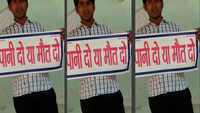 Drinking water crisis: Hathras family seeks PM Narendra Modi's permission to end life
Drinking water crisis: Hathras family seeks PM Narendra Modi's permission to end life 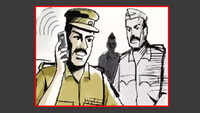 Delhi: Man posed as scribe to run extortion ring, arrested
Delhi: Man posed as scribe to run extortion ring, arrested 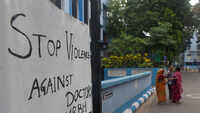 IMA to go ahead with nationwide strike tomorrow in support of protesting Bengal doctors
IMA to go ahead with nationwide strike tomorrow in support of protesting Bengal doctors  Two Delhi airport customs officials suspended for alleged sexual assault on Uzbek woman
Two Delhi airport customs officials suspended for alleged sexual assault on Uzbek woman
More from TOI
Navbharat Times
Featured Today in Travel
Quick Links
Lok Sabha Election Schedule 2019Lok Sabha Election NewsDelhi Capitals teamMI team 2019Rajasthan Royals 2019RCB team 2019Maharashtra Lok Sabha ConstituenciesBJP Candidate ListBJP List 2019 TamilnaduShiv Sena List 2019AP BJP List 2019Mamata BanerjeeBJP List 2019 MaharashtraPriyanka GandhiBJP List 2019 KarnatakaAMMK Candidate List 2019BJP List 2019 WBLok Sabha Elections in Tamil NaduBSP List 2019 UPNews in TamilLok Sabha Poll 2019Satta Matka 2018PM ModiMahagathbandhanNagpur BJP Candidate ListChandrababu NaiduTamil Nadu ElectionsUrmila MatondkarNews in TeluguMadras High CourtTejashwi YadavArvind KejriwalTejasvi SuryaPawan KalyanArvind KejriwalYogi AdityanathJaya PradaSatta King 2019Srinagar encounter
Get the app
